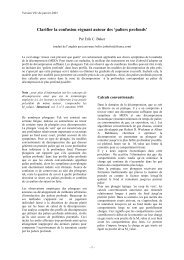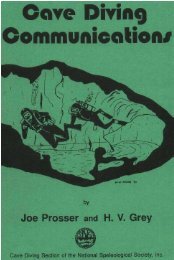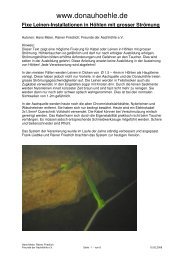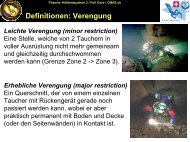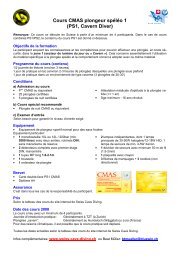A scuba diver died Monday while diving at Manatee Springs State ...
A scuba diver died Monday while diving at Manatee Springs State ...
A scuba diver died Monday while diving at Manatee Springs State ...
Create successful ePaper yourself
Turn your PDF publications into a flip-book with our unique Google optimized e-Paper software.
A <strong>scuba</strong> <strong>diver</strong> <strong>died</strong> <strong>Monday</strong> <strong>while</strong> <strong>diving</strong> <strong>at</strong> Man<strong>at</strong>ee <strong>Springs</strong> St<strong>at</strong>e Park in<br />
Chiefland — the second <strong>diver</strong> de<strong>at</strong>h in the last week in North Florida.<br />
Feb 19, 2007<br />
By ALICE WALLACE<br />
Sun staff writer<br />
Accident #1<br />
Bobby Rothel, 19, of Panhandle, Texas, was found by rescue <strong>diver</strong>s near an underw<strong>at</strong>er<br />
area called C<strong>at</strong>fish Hole in Man<strong>at</strong>ee <strong>Springs</strong>, according to Sgt. Scott Tummond with the Levy<br />
County Sheriff's Office.<br />
Rothel was airlifted to Shands <strong>at</strong> the University of Florida after being rescued from the w<strong>at</strong>er<br />
around 1 p.m. <strong>Monday</strong>, but Tummond said Rothel was pronounced dead <strong>at</strong> the hospital.<br />
Tummond would not go into specifics about how the young man got trapped under the w<strong>at</strong>er<br />
<strong>Monday</strong>. He said the medical examiner's office will be doing an autopsy, but drowning is the<br />
likely cause of de<strong>at</strong>h.<br />
"He did run out of air," Tummond said. "He was <strong>diving</strong> with two buddies and, <strong>at</strong> some point,<br />
got separ<strong>at</strong>ed from the buddies."<br />
Tummond said Rothel and his friends were not actually cave <strong>diving</strong>, but they were <strong>diving</strong> in<br />
an area th<strong>at</strong> would fall under the c<strong>at</strong>egory of cavern <strong>diving</strong> — where an overhead obstruction<br />
does not allow direct access to the surface, he said.<br />
<strong>Monday</strong>'s incident marks the second <strong>diver</strong> de<strong>at</strong>h in less than a week, with the Lafayette<br />
County Sheriff's Office reporting th<strong>at</strong> a certified cave <strong>diver</strong> from Virginia <strong>died</strong> last week <strong>while</strong><br />
<strong>diving</strong> alone in a spring along the Suwannee River.<br />
Accident #2<br />
Lafayette County Sheriff Carson McCall said last week th<strong>at</strong> the body of Ronald Wayne<br />
Simmons, 53, of Charlottesville, Va., was recovered Thursday in a remote spring in<br />
northwest Lafayette County known as Allan Millpond <strong>Springs</strong>.<br />
Simmons was reported missing Wednesday when he didn't show up <strong>at</strong> a friend's house in<br />
Alachua County, and searchers loc<strong>at</strong>ed his vehicle near the spring run th<strong>at</strong> leads to the<br />
Suwannee River.<br />
Certified cave <strong>diver</strong>s from around the area were called in to search for Simmons. They<br />
loc<strong>at</strong>ed his body about 300 feet from the mouth of a shallow cave, and by looking <strong>at</strong> dive<br />
journals, investig<strong>at</strong>ors said Simmons apparently had been inside the same cave as many as<br />
40 times before last week's f<strong>at</strong>al dive.<br />
Eine Erläuterung eines anderen Forumteilnehmers zu den Oertlichkeiten:<br />
Someone already has told a good bit about Ron so I'll not cover th<strong>at</strong> accident. Ron was a<br />
very advanced dry and wet cave <strong>diver</strong>.<br />
C<strong>at</strong>fish hotel has a downstream and an upstream. There is quite a bit of current if you go too<br />
far under the rock into the downstream. ( Upstream also has a lot of current, I personally saw<br />
a SS scooter stand still in the flow set on a 7 ) .<br />
As the opening closes in size the current gets stronger and stronger. I did most of my open<br />
w<strong>at</strong>er training <strong>at</strong> Man<strong>at</strong>ee in OW areas and I was always warned to stay clear of overhead.
Since I've gotten full cave, I've done both sides. I've got to say if you tried to swim out of the<br />
downstream when the current was bad you could really suck down a tank of air fast. If you<br />
did not have the training to deal with it I could see where the <strong>diver</strong> got in over his head in a<br />
short time trying to swim out. If on the other hand he had gone with the cave it would not<br />
have used as much air as its not a long run, but if you go through the other side you got to be<br />
real careful on exit to not get an air embolism it shoots you out so fast.<br />
I do not have any facts on wh<strong>at</strong> level the <strong>diver</strong> was trained to but if he was OW he did not<br />
have enough. Like Carl said a siphon cave is more difficult to plan for even for trained and<br />
equipped cave <strong>diver</strong>s My experience in overhead is limited <strong>at</strong> Man<strong>at</strong>ee but I do have respect<br />
for it. Regardless of wh<strong>at</strong> happens I feel for his family and friends.




